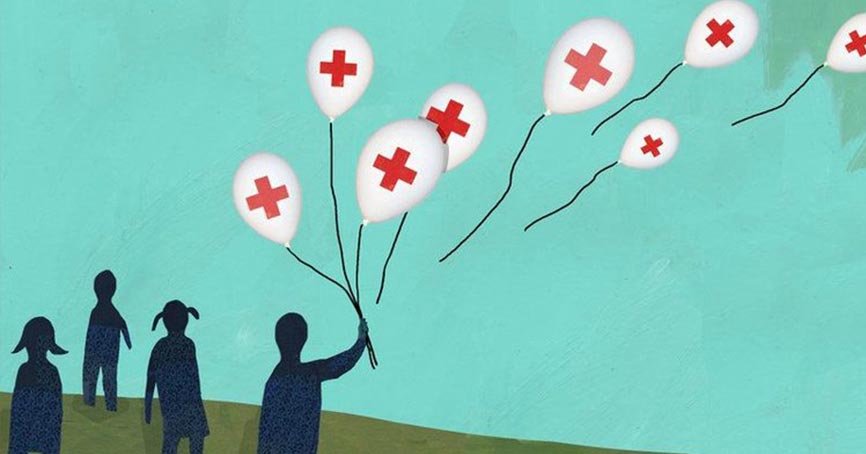Congestive heart failure is a condition of the heart where it does not pump as much blood as required. This may be due to a weak heart muscle or any other defect that prevents proper circulation in the body. Congestive heart failure symptoms must be closely watched for in patients having a past history.
Congestive heart failure does not allow the heart to function properly. Also, it comes in the heart's way while it pumps blood throughout the body. In fact, over the course of time, this leads to organs receiving lesser blood.
Types of Congestive Heart Failure
There may be two types of congestive heart failure i.e., left-sided congestive heart failure and right-sided congestive heart failure.
The most common out of the two is the left-sided congestive heart failure. In this, the left ventricle of the heart is unable to pump enough blood to the rest of the body. As a result, this can lead to a fluid build up in the lungs which, in turn, makes it difficult to breathe.
The other type, i.e., right-sided congestive heart failure is a less common condition in which the right ventricle cannot pump enough blood to the lungs. This leads to blood building in the blood vessels causing fluid retention in the arms, abdomen, legs and other organs.
Congestive Heart Failure mostly begins from the left side and later spreads to the right side if timely treatment is not provided.
It is possible for a person to have both left-sided as well as right-sided congestive heart failure at the same time.
Congestive Heart Failure Symptoms
Patients who have a history of cardiovascular health issues or are at a risk of congestive heart failure must look out for the symptoms. Also, if the symptoms do not improve after a few days, it is advisable to see the doctor. The most common symptoms of congestive heart failure include-
- Difficulty breathing/ Shortness of breath- Due to fluid accumulation in the lungs, patients may struggle to breathe when lying down.
- Swelling in legs, ankles, abdomen or hands- The swelling goes from bad to worse as time passes or after exercise.
- A persistent unexplained cough- Some people experience wheezing and blood-stained mucus.
- Fatigue- The patient may also feel tired after taking adequate rest.
- Memory changes- The condition leads to electrolyte imbalances which impair the ability of a person to think clearly.
- Nausea- In most cases, nausea is accompanied by a loss of appetite
- Dizziness- Due to an inadequate blood supply, the patient may encounter numbness or a tingling feeling.
- A rapid heart rate- As the heart is unable to pump blood in its regular rhythm, it encounters a rapid heart rate.
As some time passes by with the condition, the fluid builds up developing a painful swelling, known as edema. As a result, this swelling may undermine movement and even lead to dangerous blood clots in the legs. Moreover, the affected organs do not function properly which makes exercising and breathing much harder.
Children diagnosed with the condition experience a delay in physical development and babies with the condition struggle to gain weight.
Congestive Heart Failure Diagnosis
For diagnosis, a cardiologist would first ask an array of questions. Afterward, he would perform a physical examination. During the physical examination he would listen to the heart for abnormal heart rhythms and based on that, he would order a few diagnostic tests-
- Echocardiogram to determine if a person has poor blood flow or improper functioning heart muscle.
- Stress Tests to understand the performance of the heart under different levels of cardiac stress. For example, running on a treadmill.
- Cardiac Catheterization to identify any blockages in the arteries. This process also checks the blood flow and ventricle pressure.
- Blood Test to understand infections and a person's BNP levels, a hormone that increases with heart failure.
- MRI to take pictures of the heart.
- Electrocardiogram to record the rhythms of the heart.
Congestive Heart Failure Treatment
If diagnosed with congestive heart failure, it is best to pay a timely visit to the doctor to receive proper treatment. Some treatment options include-
- Medications to cure symptoms- Depending on the patient's condition, the doctor may suggest any suitable medications. Some medications include blood thinners to reduce the risk of blood clots, angiotensin to widen blood vessels, anti-platelet drugs to prevent the formation of blood clots, etc. Besides these, the doctor may prescribe beta-blockers, statins, calcium, and vasodilators to treat congestive heart failure.
For those suffering from congestive heart failure, medication and lifestyle changes are not enough and they may have to undergo a few medical procedures.
- Place implantable devices like an implantable defibrillator to prevent heart arrhythmia, a pacemaker to help the ventricles to contract more regularly, LVAD device to support the pumping ability of the heart.
- The doctor may recommend a number of other procedures like angioplasty to open a blocked artery, coronary artery bypass surgery, valve replacement surgery or even heart transplant. The doctor may use a stent to hold the blood vessel open.
Bibliography
- https://wa.kaiserpermanente.org/healthAndWellness/index.jhtml?item=%2Fcommon%2FhealthAndWellness%2Fconditions%2FheartDisease%2FchfNutrition.html
- https://www.medicinenet.com/congestive_heart_failure_chf_overview/article.htm
- https://www.webmd.com/heart-disease/guide-heart-failure#1
- https://medlineplus.gov/heartfailure.html
- https://www.medicalnewstoday.com/articles/317848.php
- https://www.healthline.com/health/congestive-heart-failure#chf-and-genetics

 Jul 10, 2018
Jul 10, 2018
 May 30, 2018
May 30, 2018 May 10, 2018
May 10, 2018 May 17, 2018
May 17, 2018